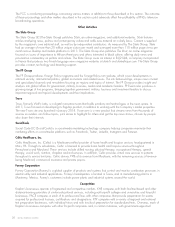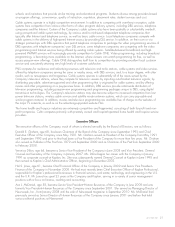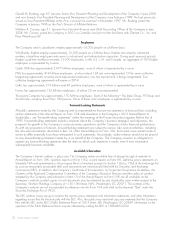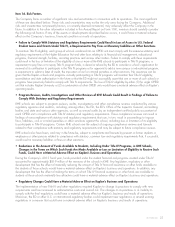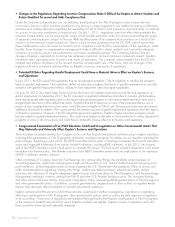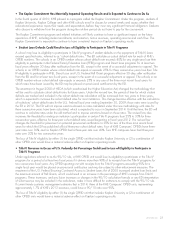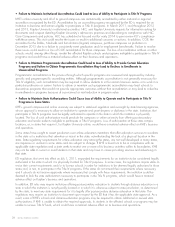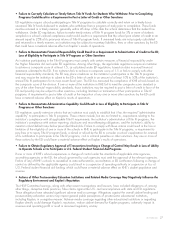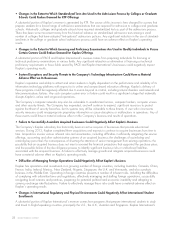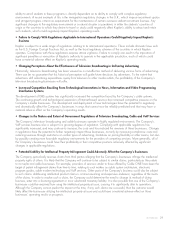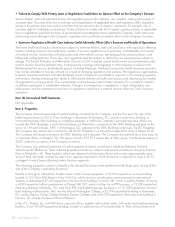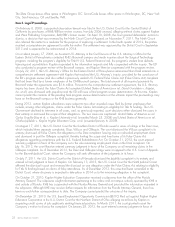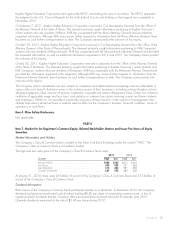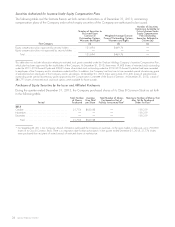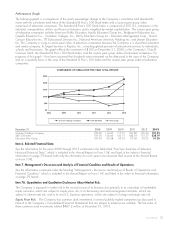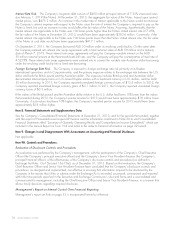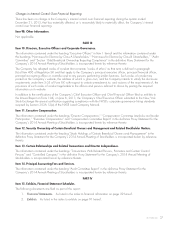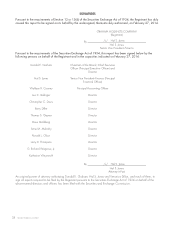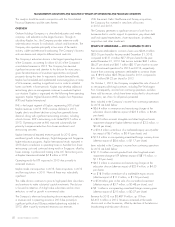Washington Post 2013 Annual Report Download - page 48
Download and view the complete annual report
Please find page 48 of the 2013 Washington Post annual report below. You can navigate through the pages in the report by either clicking on the pages listed below, or by using the keyword search tool below to find specific information within the annual report.• Failure to Comply With Privacy Laws or Regulations Could Have an Adverse Effect on the Company’s Business
Various federal, state and international laws and regulations govern the collection, use, retention, sharing and security of
consumer data. This area of the law is evolving, and interpretations of applicable laws and regulations differ. Legislative
activity in the privacy area may result in new laws that are relevant to the Company’s operations, for example, use of
consumer data for marketing or advertising. Claims of failure to comply with the Company’s privacy policies or applicable
laws or regulations could form the basis of governmental or private-party actions against the Company. Such claims and
actions may cause damage to the Company’s reputation and could have an adverse effect on the Company’s business.
• Extensive Regulation of Health Care Industry Could Adversely Affect Celtic’s Business and Results of Operations
The home health and hospice industries are subject to extensive federal, state and local laws, with regulations affecting
matters including licensure and certification, quality of services, qualifications of personnel, confidentiality and security
of medical records, relationships with physicians and other referral sources, operating policies and procedures, and
billing and coding practices. These laws and regulations and the manner in which they are interpreted are subject to
change. The Patient Protection and Affordable Care Act of 2010 and the overall trend toward cost containment could
result in insurers lowering payment rates, limiting service coverage and engaging in other measures to reduce costs.
Reimbursement for services by third-party payers, including Medicare, Medicaid and private health insurance providers,
may not be available or may be reduced as a result of changing regulations and policies. Managed-care organizations,
hospitals, physician practices and other third-party payers continue to consolidate in response to the evolving regulatory
environment, thereby enhancing their ability to influence the delivery of health care services and decreasing the number
of organizations serving patients. This consolidation could adversely impact Celtic’s business if it is unable to maintain
its ability to participate in established networks. Changes in existing laws or regulations, in their interpretation and
enforcement, and the enactment of new laws or regulations could have a material adverse effect on Celtic’s business
operations.
Item 1B. Unresolved Staff Comments.
Not applicable.
Item 2. Properties.
The Company retained ownership of certain buildings occupied by the Company and the Post upon the sale of the
publishing businesses in 2013. These buildings in downtown Washington, DC, include a seven-story building, a
connected nine-story office building on contiguous property, in which the Company’s principal executive offices are
located (the GHC Building), a small office building on L Street that is connected to the GHC Building and land on the
corner of 15th and L Streets, NW, in Washington, DC, adjacent to the GHC Building (collectively, the DC Properties).
The Company has entered into a contract to sell the DC Properties in a transaction expected to close in March 2014.
The Company will remain a tenant in the GHC Building until it relocates. The Company has entered into a new lease for
its corporate offices in Arlington, VA. The space consists of 33,815 square feet of office space, and the lease expires in
2024, subject to an option of the Company to extend.
The Company also retained ownership of certain properties formerly owned by its subsidiary Robinson Terminal
Warehouse LLC (Robinson). These retained properties include two wharves and several warehouses along the Potomac
River in Alexandria, VA. These facilities, which are adjacent to the business district and occupy approximately seven
acres of land, are under contract for sale in two separate transactions. Each transaction is expected to close in 2015,
contingent on each buyer obtaining certain land-use approvals.
The remaining properties owned or leased by the divested businesses were transferred to the Buyer upon closing of the
sale of the Company’s publishing businesses.
Directly or through its subsidiaries, Kaplan owns a total of seven properties: a 30,000-square-foot, six-story building
located at 131 West 56th Street in New York City, which serves as an education center primarily for international
students; a redeveloped 47,410-square-foot, four-story brick building in Lincoln, NE, which is used by Kaplan University;
a 4,000-square-foot office condominium in Chapel Hill, NC, which it utilizes for its KTP business; a 15,000-square-foot,
three-story building in Berkeley, CA, used for its KTP and English-language businesses; a 131,000-square-foot, five-story
brick building in Manchester, NH, used by Mount Washington College; a 25,000-square-foot building in Hammond,
IN, used by Kaplan Career College (formerly Sawyer College); and a 45,000-square-foot, three-story brick building in
Houston, TX, used by the Texas School of Business.
In the U.S., Kaplan, Inc. and KHE lease corporate offices, together with a data center, call center and employee-training
facilities, in two 97,000-square-foot buildings located on adjacent lots in Fort Lauderdale, FL. Both of those leases will
30 GRAHAM HOLDINGS COMPANY


